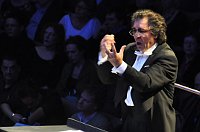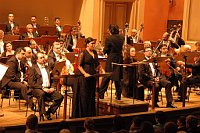PRAGUE - A few minutes before the concert starts, Riccardo Sahiti says he can’t believe all this is real, that it’s not a dream. He’s standing in the ornate conductor’s room of the Rudolfinum in Prague – one of Europe’s premier concert halls. All around him are photographs of his idols – conductors such as Herbert von Karajan, Carlos Kleiber, Leonard Bernstein.
Sahiti is 51 years old but he’s as nervous as a schoolboy facing exams. He walks over to the piano, closes his eyes, plays the first few notes of the piece he’s about to conduct. His wife comes over to smooth out his full black hair. There’s a knock on the heavy wooden door, and when it opens the loud buzz of the audience chatting in the hall fills the room. Sahiti adjusts his coat jacket one last time, kisses his wife on the cheek, and heads for the conductor’s podium.
The concert is sold out, and Sahiti’s appearance is met with a long round of applause. On the podium, he looks the musicians in the eyes, smiles, and they smile back. Nearly 10 years ago to the day, Sahiti founded the Roma and Sinti Philharmonic. It started out as a small project, which was hardly taken seriously. Now Sahiti stands before 60 musicians, from Germany, Romania, Hungary. All the orchestra members belong to the ethnic minority called Roma or Sinti: Gypsies; some of them have been abused, others bullied. At the Rudolfinum, they are playing for the public, but also for themselves – and against centuries of stereotypes.
Riccardo Sahiti grew up near Pristina in Kosovo. Musically inclined, he was lucky to have wealthy parents who could afford to buy him a piano and send him to study at the conservatory in Belgrade. He practiced up to 15 hours a day, and in 1988 won a scholarship to study in Moscow.
When war broke out in Kosovo in 1992, he fled to Frankfurt where he auditioned for a place in several orchestras. He was always turned down. The director of one music school told him: “You have a lot of talent, but you don’t fit in here.” Sahiti asked if that was because of his Roma origins but didn’t get an answer. "It might have been a lot easier if I’d had been German or American,” he says.
At the start of the new millennium, Sahiti decided to engage in an original form of protest. He knew that there were a few Sinti and Roma musicians in the big orchestras like the Vienna State Opera, the Leipzig-based MDR Symphony (Germany’s oldest radio orchestra) and the Romanian National Orchestra. He invited them, and musicians who invited other musicians. He would let them stay in his apartment, and at night in his living room, crowded with concert posters and his record collection, they talked late into the night.
During the day, they rehearsed and handed out flyers. Then, after months of planning, in Nov. 2002 in Frankfurt, the Roma and Sinti Philharmonic gave its first concert. None of the musicians asked to be paid. "The concert hall was packed; people actually came out to hear us,” says Sahiti holding back tears.
Hiding their origins
Johann Spiegelberg was one of the original members of Sahiti’s orchestra. Spiegelberg has a Jewish mother and a father with Roma roots. Spiegelberg is not his real name, which he does not want revealed.
"I’ve had some bad experiences, I have to think of my son,” he says. He grew up in Romania, on the Black Sea coast, and received a first-class musical education. For two decades he has lived and worked in a large city in the eastern part of Germany where, he says, now and again people still make him feel he’s not one of them. He relates how recently he was on his way to a concert, wearing his coat jacket, and when he drove into a gas station to fill up his Mercedes a couple of youths spotted him and called over: “You people live well in Germany, at our expense." He says he didn’t respond to the taunt.
The Sinti and Roma orchestra is a way of showing "that we’re not criminals," Spiegelberg says, adding that this stereotype revolts him. And although famous Sinti and Roma like singer Marianne Rosenberg, jazz musician Django Reinhardt – and conductor Riccardo Sahiti – are made much of, according to Spiegelberg, many less well-known musicians of Sinti and Roma heritage keep quiet about it out of fear of prejudice. In Prague, for example, the orchestra had trouble renting double basses because rental firms thought they might never see the instruments again.
Passing on a cultural heritage
On the evening before the concert in Prague, some orchestra members gathered in the lobby of the hotel. They compared instruments, chatted about Beethoven and Schubert, sang, laughed. "It’s like a class trip," Sahiti laughs. He says rivalries such as one sees in other orchestras are absent in this one because "we all want to pass on our cultural heritage."
It is a considerable heritage. Over 80 operas were inspired by Roma. Jewish Klezmer music, Andalusian flamenco, the Cuban rumba were also all inspired by Roma. Despite this, Roma culture is often written off as being about little more than fiery violin players or Carmen in Bizet’s 1875 opera. In Germany, no state institution teaches Roma music or literature, or even the Romani language. Sinti and Roma were only recognized as one of Germany’s official minorities in 1997. The Philharmonic is the only orchestra of its type.
In Prague, the Philharmonic played the "Auschwitz Requiem," a powerful piece for orchestra, four soloist singers and a choir, composed by Roger Moreno, a Swiss Sinto. "Writing it took so much energy, " Moreno says. "I sometimes wonder how I was even able to finish it."
He remembers being called a “smelly Gypsy” when he was in school, and that many doors were closed to him as a musician. So with his wife, he created an ensemble to play traditional music. After his first visit to Auschwitz in 1998 he decided to write what would be a "living monument" to Holocaust victims. "Very few people know that the Nazis murdered 500,000 Sinti and Roma," he says. He wrote six of the eight stanzas of his requiem right away, then suffered ten long years of “composer’s block” before he was able to complete the work.
The Roma Philharmonic premiered the piece last May in Amsterdam during the annual celebrations marking the end of World War II. Never before in the Netherlands had the Roma received so much public attention: Queen Beatrix even invited Moreno for coffee.
The Philharmonic was signed up to play the “Auschwitz Requiem” at Frankfurt’s Old Opera House, with plans to play in Kracow and possibly Berlin in January. Much has to be improvised, as the orchestra has no permanent rehearsal space, no office. Sahiti dreams of creating a music association with a choir, ballet, and a cultural campus, but lacks financing.
The 100,000-euro cost of the Prague concert was paid for by European sponsors and Czech activist groups. Most of the tickets in the 1,000-seat concert hall were handed out free to people leading anti-discrimination initiatives, foundations, and politicians – there are hardly any “regular” concertgoers.
While the Czech media did report quite extensively on the orchestra’s appearance, says Jitka Jurková, a member of the organizing team, "they barely said a word about the political message. The orchestra was portrayed in the usual way, as something ‘exotic’." She doesn’t believe that the concert will do much to decrease animosity to the Sinti and Roma.
But none of this is an issue on the night of the concert. Sahiti raises his arms; the music starts. How much he enjoys his work is clear to the last notes of the requiem, which ends with soft bell-like sounds. Slowly, Sahiti lowers his arms. The applause lasts for nearly 15 minutes. Tomorrow morning the orchestra moves on to Budapest to give a concert there.
As he moves about the empty stage collecting some sheet music forgotten by his musician colleagues, he looks up: "This is just the beginning..."













